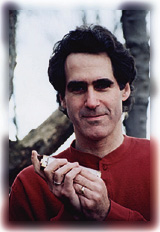Main Menu · Search ·Current Issue ·Contact ·Archives ·Centennial ·Letters to the Editor ·FAQs
| Books: Which Side Were You On? | Books: Academics in Aspic |
| Off the Shelf | Chapter & Verse |
| Music: Alone at Last | Open Book: A Fusillade at Harvard |

|
Richard Hunter '74 yearns to be the apologist for unaccompanied harmonica music, to "establish a body of work for solo performance on my instrument." He's in a good position to do so. As the author of a well-known instructional book, Jazz Harp, Hunter seems to be familiar with every effect the harmonica can create. And with his debut CD, The Act of Being Free in One Act, he has a chance to put them to good use.
The CD has a satisfying mix of tunes, half jazz standards or bluegrass, and half originals. Though Hunter's composition "Winter Sun at Nobska" sounds spare and a bit abstract, his "Peppermint Life" and "Golden Mel" have real joy in them, pulsing faster and faster, only to slow suddenly with a bluesy riff, or an accented bending of a note. Stylistically, Hunter is nearer the high-strung virtuosity of Larry Adler than the smooth lyricism of Toots Thielemans. He loves sudden crescendos, swelling tremolos, runs up the scale; he even punctuates one tune with hoots and growls.

|
The ornamentation can occasionally be misplaced. The melody line of Duke Ellington's "In a Sentimental Mood" is obscured by oddly accented phrasing, and Hunter's rendition of the folk tune "When Johnny Comes Marching Home" seems overwrought. Still, Hunter can swing. Just try to resist toe-tapping to his own "Big 17" or his arrangement of Ben Tucker's "Comin' Home Baby."
Hunter takes such obvious pleasure in the harmonica's sound that you can forgive his rococo stylings. He even manages to convince the listener--without overdubs--that he has a rhythm section backing him up. This is no mean feat; Hunter shows us his and his harmonica's chops, and in the process begins clearing a place for the jazz harp, solo.
~Daniel Delgado